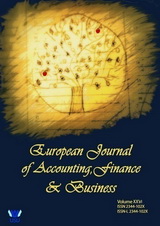|

ISSN: 2344 - 102X
ISSN-L: 2344 - 102X
Our journal is currently indexed in the following databases:
|
| |
Article from Volume 10, Number 2, Year 2022| HUMAN CAPITAL AND SUSTAINABLE DEVELOPMENT | 
Download | | Author(s): Lilia Sava, Valentina Tirsu | | DOI: 10.4316/EJAFB.2022.10211 | | Abstract: In this paper was analyzed the concept of human capital in the context of implementing the principle of a sustainable development at global and national level. The basic purpose of the research theme is presented in the form of ensuring the need for the development of the labor force in an efficient form in the Republic of Moldova, taking into account the competitiveness and sustainability in this sphere of influence. The sustainable development of a country can be perpetuated and ensured only by increasing the quality of human capital, which is a prerequisite for achieving the basic goal over time, while being a primary factor strictly necessary for increasing its economic capacity. The research methodology includes a diverse set of methods such as: induction, deduction, comparative analysis, synthesis, scientific abstraction. Thus, human capital is identified as an indispensable factor for the sustainable development, where its accumulation is defined as the main condition for progress and innovation, as means of reducing the economic deficit, as a precondition for a more optimal transformation of natural reserves into production capital. | | Keywords: Sustainable Development; Human Capital; Education; Ecology | References:
1. Armstrong, M. (2008). Strategic Human Resource Management. 4th Edition. Publisher London, Kogan Page, 2008.
2. Becker, G. (1994). Human Capital. 3rd Ed. Publisher New York, Columbia University Press.
3. Schultz, T. (1971). Investment In Human Capital: The Role Of Education And Research. Publisher New York: Free Press, Mac Millan.
4. Angheluta, P.S., Badea, C.G. (2018). The Green Economy Influence On Urban Sustainable Development, Economics, Management, And Financial Markets 13(3), 315-326.
5. Jakimovski, J. (2000). Unemployment And Social Problems, Economic And Social Aspects Of Unemployment In Macedonia And Bulgaria And The Prospects For Poverty Reduction. Publisher Proceedings Of Skopje: Institute For Sociological Political And Juridical Research, Economic Institute Skopje And Frideich Ebert Stiftung, Skopje, 41-49.
6. Schwab, K. (20
19). The Global Competitiveness Report 2019. Publisher Geneva: World Economic Forum. ISBN-13: 978-2-940631-02-5, 666.
7. Maimunah, I., Lawrence, A. (2008). Workforce Diversity: A Human Resource Development Perspective Towards Organizational Performance, European Journal Of Social Sciences 6(2), 244-251.
8. Shrader, R., Siegal, D. (2007). Assessing The Relationship Between Human Capital And Firm Performance: Evidence From Technology-based New Ventures, Entrepreneurship Theory And Practice, 893-908.
9. Lojko, V.V. (2008). ????????????? ????????? ???????????? ????????????? ???????? ??? ???????? ??????? ????????????? ?????????-?????????????? ????????, ???????????? ? ???????? ??????????? ????????? (??????????? (??????????) ??????) 4(28).
10. Maliteva, ?. ?., ?bodet, R.V. (2014). ?????? ????????????? ???????? ?? ?????? ?????????? ????????????? ????????? (?? ??????? ?????? ? ???????). ???????????? ? ????, ???????? ????y, ????????????? ? ??????????? ????? 1(1), 15-21.
11. Conceição, P. (2020). The Next Frontier. Human Development And The Anthropocene. UDNP, Human Development Report 2020. By The United Nations Development Programme 1 UN Plaza, New York, NY 10017 USA
|
| | Back to journal ... |
|
|
| |
|
|
|

